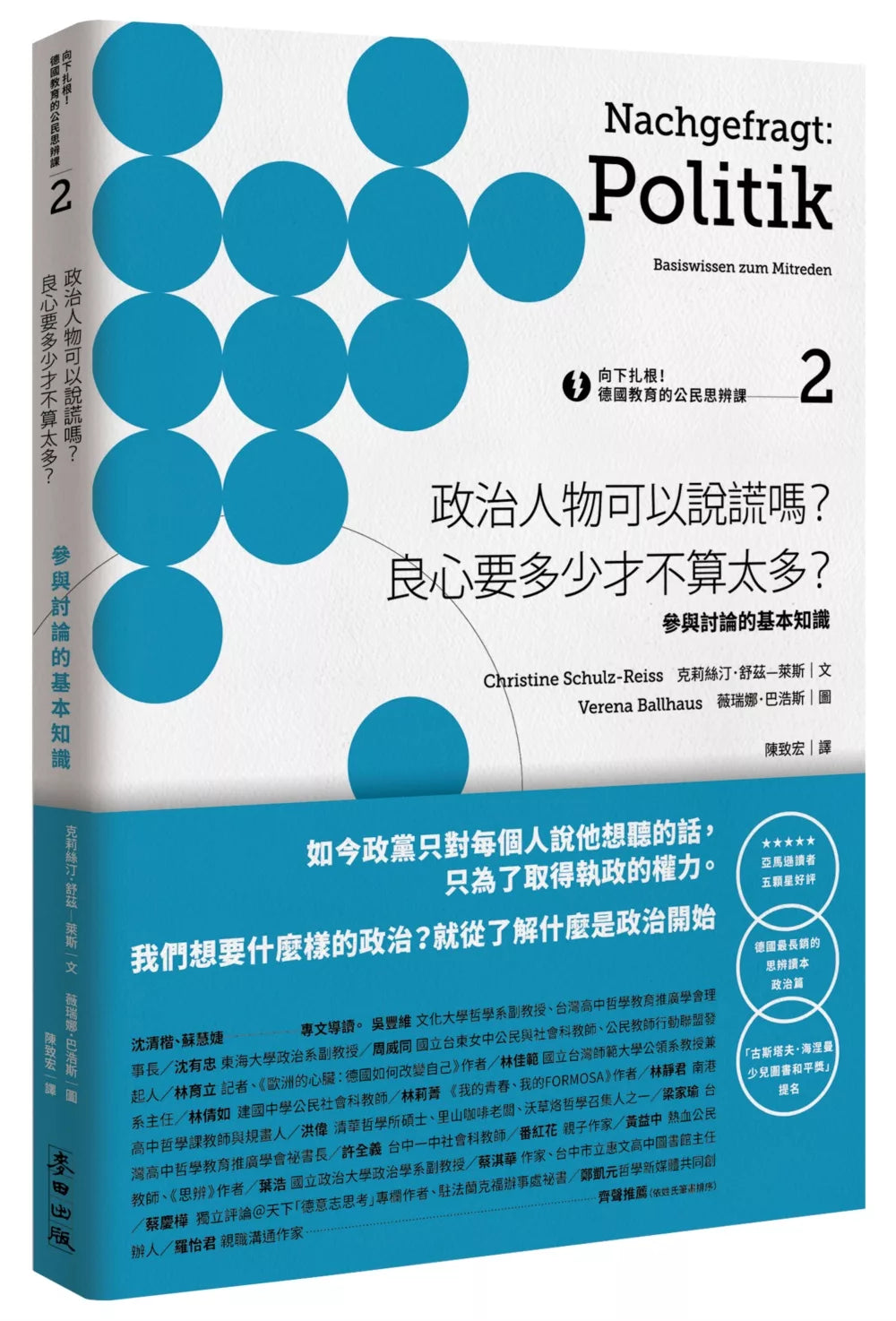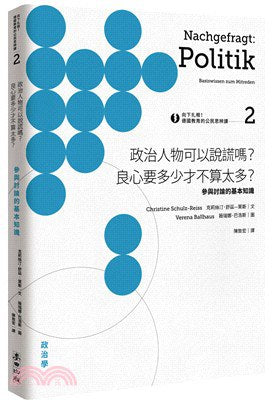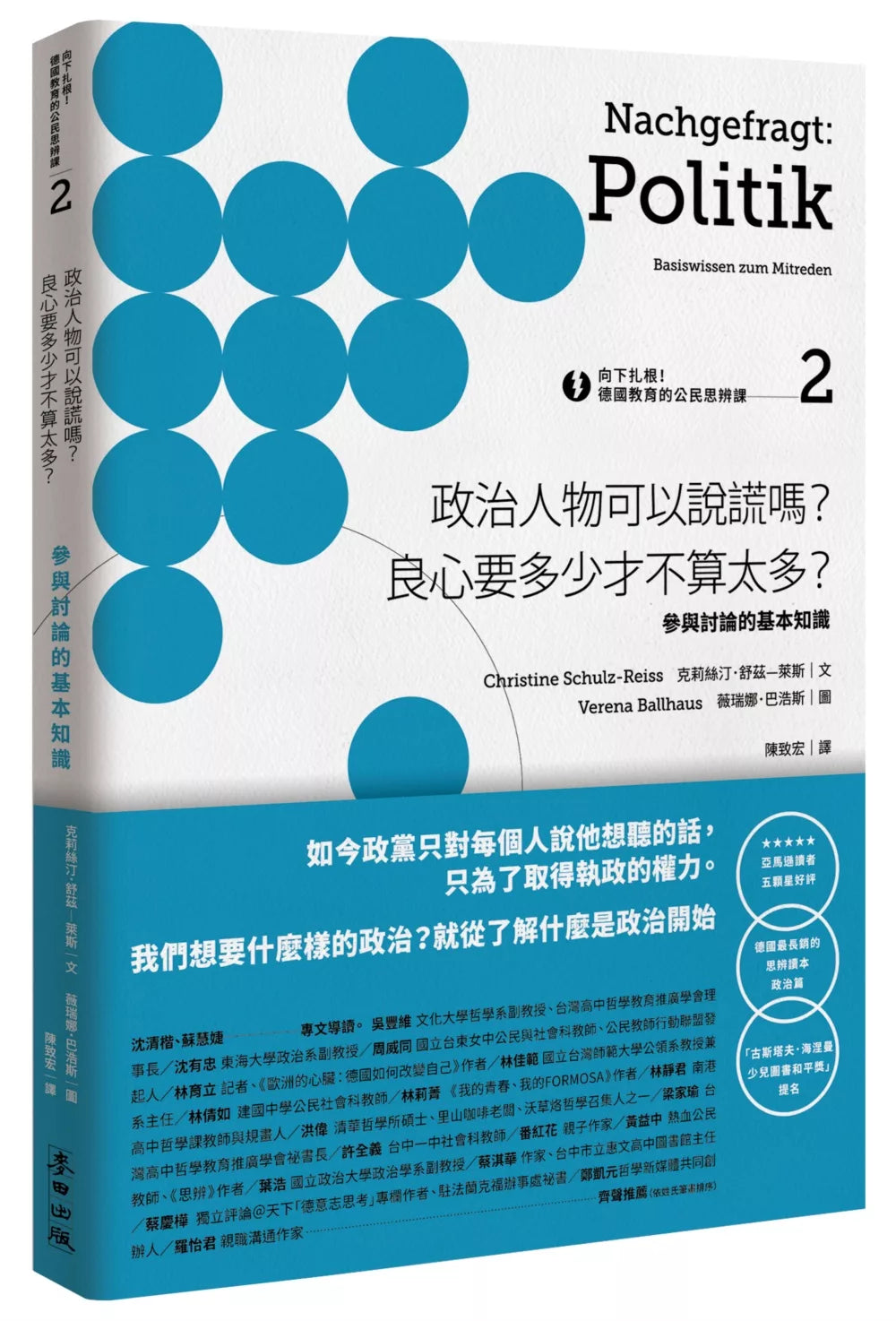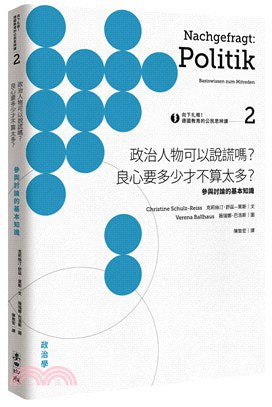1
/
of
2
Taking root! German Education's Civics Lesson 2 - "Can politicians lie? How much conscience is too much?": Basic knowledge for participating in discussions
Taking root! German Education's Civics Lesson 2 - "Can politicians lie? How much conscience is too much?": Basic knowledge for participating in discussions
Christine Schulz-Rice Chen Zhihong and Verena Bauhaus 译
Regular price
$18.99 USD
Regular price
Sale price
$18.99 USD
Unit price
/
per
Low stock
Couldn't load pickup availability
About Book
About Book
Nachgefragt: Politik
※Germany's most popular critical reading - Politics※ Citizens are the most important here, but how do we make the right choices? How should we care about politics? ● Can politicians lie? How much conscience is not too much? Politicians lie to run for election and break their promises after the election; in order to force their political opponents into a corner, they use all means to damage their reputation and people's trust in them; some MPs ignore absurd agreement regulations and hand over their conscience at the party gate; some unscrupulous companies pay local politicians in exchange for government tenders... The most terrifying thing is that we seem to have become accustomed to this. "When politics uses increasingly complex language to try to make you feel like you don't need to know what politicians are doing, that's when we should be alert, because the evils of politics can arise amidst our apathy and indifference." -- Shen Qingkai / ◎ Money is king!? Who do politicians listen to? ◎ Why is it difficult for small parties to govern? What are excess seats? ◎ What are the responsibilities of the mediation committee? ◎ Referendum proposals - where can you and I influence them? We've likely heard others express their feelings about politics: the usual verbal battles, physical wrestling, and political divisions between the ruling and opposition parties. However, the 318 student movement may have made many people realize that politics is a form of citizen participation and is no longer just "the business of people managing the affairs of the public." Unfortunately, Taiwan's current curriculum is mostly still based on stereotyped teaching rather than focusing on critical thinking, and the time arrangement is relatively compressed, so that students are often exposed to political courses in college; there is an obvious gap in the middle. In contrast, in addition to Chinese, mathematics and science, civic courses also account for a considerable proportion of the compulsory courses in German high schools, such as "Political Economy", "Civil Education" and "Social Studies". Through this long-selling critical reading book in Germany, we see the way German students understand political affairs and how the author uses easy-to-understand examples to guide readers' thinking and stimulate their interest. Admittedly, the content of the book uses Germany as an example. For readers who want to expand their international horizons or students majoring in German, it is undoubtedly a good introductory book. For high school readers, when they first read it, they may start by comparing the differences between Taiwan and Germany. They can also start by picking out interesting topics as topics for discussion to understand politics, which is related to all of our lives. I hope that the seeds of political education can take root in Taiwan in the future. Features of this book: ◎ The author uses real-life examples to explain the various aspects and abstract concepts involved in political news (for example, the purpose and mission of the country's formation, the relationship between money and politics, the issues of taxation and distribution, and various political theories). After reading it, you will find that caring about politics can be so interesting! Taiwan's legal and political systems are largely inherited from Germany. This book offers a comparative political perspective, examining the similarities and differences between Taiwan's current political system and Germany's. This book is also the easiest and most accessible resource for understanding German politics! Award-winning illustrations are included; key points and annotations are highlighted for clarity. ★★Nominated for the Gustav Heinemann Children's Book for Peace Prize★★Amazon Reader Five-Star Recommendation / ●Su Huijie, Research Assistant at the Institute of European and American Studies, Academia Sinica: What can we learn from this "German Politics Reader"? Through passages on the Nazi and East German authoritarian regimes, as well as the US-Soviet Cold War, we can see Taiwan's own 38-year history of martial law and its helpless position between powerful states. From this perspective, readers may be able to more deeply appreciate the temporal context of the German Constitution's design, and understand how a nation's constitution-makers, faced with historical trauma and domestic and international circumstances, designed a political system that provides equal and sustainable protection for all citizens of our shared nation. Furthermore, who should be guaranteed equal rights in marriage, energy security, intergenerational justice, and working conditions? Can I? Can you? Are we willing to unite and protect him? For Taiwanese society today, mired in decades of political apathy during the White Terror, isolated from international political participation yet deeply impacted by economic globalization, and witnessing and experiencing the anti-establishment democratic movement and even democratic degeneration from 2014 to 2016, this book reminds us once again that politics is a daily matter affecting all of us. It also spurs us to reconsider the simple yet profound question: "Where do we each come from, and where are we going together?" ● Shen Qingkai, PhD in Philosophy from the University of Leuven, Belgium: "Politics" covers everything from civil rights to federalism, party politics, separation of powers, and bill passing, as well as various political theories ranging from the left-right spectrum to the different meanings represented by various ideologies such as capitalism, liberalism, socialism, and communism, as well as issues of taxation and distribution, to the acute relationship between money and politics, the principle of interest avoidance for those holding public power, and how the media, as the fourth estate, monitors these powerful individuals. From a focus on domestic politics to a consideration of international geopolitics: Introductions to diverse organizations such as the Geneva Treaty, NATO, the Cold War, the European Community, the UN Security Council, and the International Criminal Court illustrate the breadth of political education and provide an understanding of the kind of political thinking the author aims to impart to the next generation. With the emergence of the European far right, even neo-Nazis, and the threat posed by terrorism, should Germans cling to a defense of national sovereignty and ignore refugees and immigrants? Or should they understand how xenophobia is manipulated and the need for calm and rational thinking? The purpose of political education is not only to provide a reference for future politicians but also to offer current politicians the opportunity to reflect on the purpose of politics, if not the pursuit of personal gain. It also reminds them of their original aspiration for publicness. Author/Director of the Taichung Municipal Huiwen High School Library, Cai Qihua: When the speaker is reticent and the listener is indifferent, it means the speaker has lost their voice in the clamorous postmodern world. Therefore, we need to read "Basic Knowledge for Defending Rights" and rethink which piece of the puzzle of our literacy within the frameworks of democracy, politics, and philosophy is missing, preventing us from becoming voices in the 21st century. This book is concise and clear, using real-world examples for easy reading. It is a long-seller among German youth. Taiwan, which hopes to inherit much of its legal and political system from Germany, should seriously study this set of books. This will allow Taiwan to become, like Germany, a global center of political, economic, and cultural development by speaking out! [Praise from All Circles] (Listed by the number of strokes in surname) Wu Fengwei, Associate Professor of Philosophy at Chinese Culture University and Chairman of the Taiwan Association for the Promotion of High School Philosophy Education; Shen Youzhong, Professor of Political Science at Tunghai University; Shen Qingkai, PhD in Philosophy from the University of Leuven, Belgium; Zhou Weitong, Civics and Social Studies Teacher at National Taitung Girls' High School and Founder of the Civic Teachers' Action Alliance; Lin Yuli, Reporter and Author of "The Heart of Europe: How Germany Changed Itself"; Lin Jiafan, Professor and Head of the Department of Public Affairs at National Taiwan Normal University; Lin Qianru, Civics and Social Studies Teacher at Chiang Kai-shek Junior High School; Lin Lijing, Author of "My Youth, My FORMOSA"; Lin Jingjun, Philosophy Teacher at Nangang Senior High School Course teacher and planner: Hong Wei, Master of Philosophy from Tsinghua University, owner of Lishan Coffee, and co-convener of Wocaola Philosophy; Liang Jiayu, Secretary-General of the Taiwan High School Philosophy Education Promotion Association; Xu Quanyi, Social Science teacher at Taichung First High School; Huang Yizhong, author of Saffron Parenting, and author of "Thinking"; Yang Cui, Associate Professor of Chinese Literature at National Dong Hwa University; Ye Hao, Associate Professor of Political Science at National Chengchi University; Cai Qihua, writer and library director of Taichung Municipal Huiwen Senior High School; Cai Qinghua, Independent Commentary @ Tianxia, author of the "German Thinking" column and secretary of the Frankfurt Office; Zheng Kaiyuan, co-founder of Philosophy New Media, and personal communication writer; Luo Yijun, author of "Family Communication"
Publication Date
Publication Date
2017-06-08
Publisher
Publisher
麥田
Imprint
Imprint
Pages
Pages
160
ISBN
ISBN
9789863444602
share



